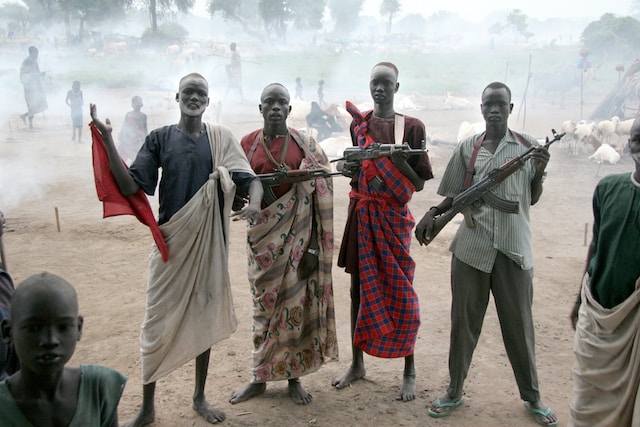Sudan’s Treasury Suffers Loss of $2 Billion in Gold Reserves
Synopsis
The current armed conflict in Sudan has not only resulted in hundreds of lives lost and injuries but has also had a severe impact on Sudan's economy. With the suspension of operations at Khartoum airport and the loss of $2 billion in gold revenues from the Sudanese treasury, Sudan is facing significant commercial losses that have already had a catastrophic effect on the country.

Key Takeaways
- Sudan is facing an armed conflict between rival factions of the military government, resulting in the loss of hundreds of lives and injuries.
- The conflict has had a significant impact on Sudan's economy, including the loss of $2 billion in gold revenues from the Sudanese treasury.
- Sudan has been grappling with a declining economy, with poverty and unemployment rates over 60% and 40%, respectively.
- Prolonged conflict could have devastating consequences for Sudan, including worsening inflation rates and the collapse of the Sudanese currency.
- The Sudanese government must take swift action to address the economic crisis and bring an end to the conflict.
The Impact of Armed Conflict on Sudan's Economy
Sudan is currently enmeshed in an armed conflict between rival factions of the military government, resulting in the loss of at least 459 lives and 4,072 injuries as of 25 April 2023. The majority of the clashes have occurred in Khartoum, the capital, and the Darfur region. This conflict has already had a significant impact on Sudan's economy, with economists warning of severe consequences if the fighting continues.
One of the most notable effects of the conflict is the loss of $2 billion in gold revenues from the Sudanese treasury. The disruption caused by the suspension of operations at Khartoum airport has disrupted 5% of Sudan's total exports and imports, amounting to $15 billion. This has had a significant impact on Sudan's economy, with concerns that the ongoing conflict could have catastrophic effects on the country.

Could Wagner be Involved?
The ongoing conflict in Sudan has brought attention to the ties between the Sudanese military and the Russian mercenary group, Wagner. The situation escalated when a rogue general began attacking the ruling junta, resulting in the deaths of at least 97 civilians in just three days. Wagner had established a front company, Meroe Gold, which was owned by M Invest, a firm controlled by Yevgeny Prigozhin, a Putin oligarch.
The powerful Rapid Support Forces leader, Mohamed Hamdan Dagalo ('Hemedti'), is fighting for control of the capital against Abdel Fattah al-Burhan. Wagner allegedly provided the RSF with weapons and training in exchange for access to Sudanese mines for gold worth billions.
Although the role of Wagner in the current conflict remains unclear, it is noteworthy that the violence erupted shortly after the arrest of a Russian national. The said individual is the head of security for a suspected front-company of Wagner and is accused of smuggling gold.

The Decline of Sudan's Economy
Sudan has long been grappling with a declining economy, with over 60% of the population living in poverty and unemployment rates over 40%. This economic downturn played a pivotal role in the fall of the previous regime, and the current transitional government has struggled to achieve political and economic stability since the December Revolution. They have failed to stimulate local production effectively, leading to a lack of investment in essential sectors like infrastructure and agriculture.

The Severe Consequences of Prolonged Conflict
The current conflict has only added to the economic woes of Sudan. Economists fear that if the fighting continues, it could have devastating consequences for the country. The loss of $2 billion in gold revenues from the Sudanese treasury is a severe blow to the economy.
The disruption to the import and export of goods due to the suspension of operations at Khartoum airport has caused significant commercial losses, leading to an increase in the prices of basic goods and services, making them unaffordable for many Sudanese people.
Moreover, extended conflict in Sudan could have devastating effects. The gross domestic reserve would be affected, and inflation rates would worsen, leading to the collapse of the Sudanese currency. This would exacerbate the already high poverty and unemployment rates and lead to a decrease in living standards.

The Importance of Swift Action and International Aid
The current conflict is also taking a severe toll on the Sudanese people. With hundreds of people losing their lives and thousands injured, many families have been left grieving, and the health system is struggling to cope with the number of injured people. The continued violence is also causing significant mental health challenges for many Sudanese people.
It is crucial that the Sudanese government takes swift action to address the economic crisis and bring an end to the conflict. The international community also has a crucial role to play in providing support and aid to Sudan. The country needs assistance in the form of humanitarian aid, development aid, and investment. By providing this support, the international community can help to mitigate the consequences of the conflict and support Sudanese people in rebuilding their lives and their economy.
Related Articles
This guide and its content is copyright of Chard (1964) Ltd - © Chard (1964) Ltd 2024. All rights reserved. Any redistribution or reproduction of part or all of the contents in any form is prohibited.
We are not financial advisers and we would always recommend that you consult with one prior to making any investment decision.
You can read more about copyright or our advice disclaimer on these links.





















